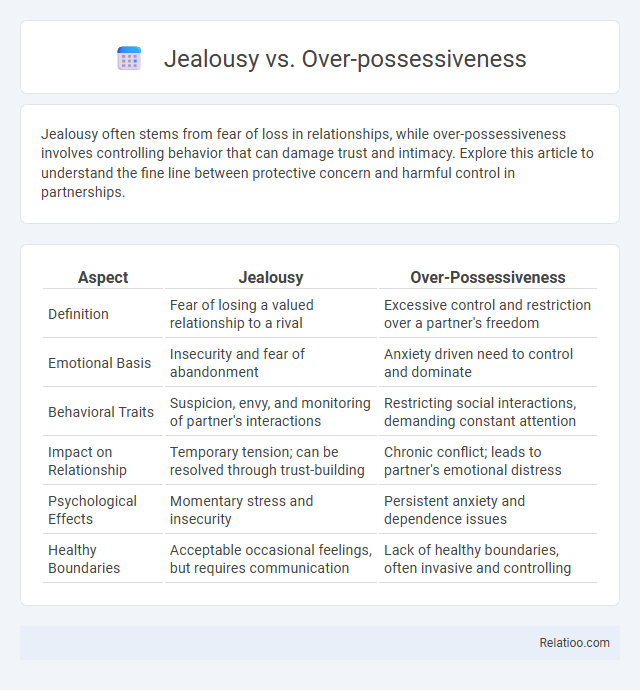Jealousy often stems from fear of loss in relationships, while over-possessiveness involves controlling behavior that can damage trust and intimacy. Explore this article to understand the fine line between protective concern and harmful control in partnerships.
Table of Comparison
| Aspect | Jealousy | Over-Possessiveness |
|---|---|---|
| Definition | Fear of losing a valued relationship to a rival | Excessive control and restriction over a partner's freedom |
| Emotional Basis | Insecurity and fear of abandonment | Anxiety driven need to control and dominate |
| Behavioral Traits | Suspicion, envy, and monitoring of partner's interactions | Restricting social interactions, demanding constant attention |
| Impact on Relationship | Temporary tension; can be resolved through trust-building | Chronic conflict; leads to partner's emotional distress |
| Psychological Effects | Momentary stress and insecurity | Persistent anxiety and dependence issues |
| Healthy Boundaries | Acceptable occasional feelings, but requires communication | Lack of healthy boundaries, often invasive and controlling |
Understanding Jealousy: Definition and Causes
Jealousy is an emotional response triggered by perceived threats to a valued relationship, often stemming from fear of loss, insecurity, or low self-esteem. Unlike over-possessiveness, which manifests as controlling behavior and excessive attachment, jealousy is primarily an internal feeling that can lead to protective actions. Understanding the psychological roots and situational triggers of jealousy helps differentiate it from related behaviors such as over-possessiveness or obsessive jealousy.
What is Over-possessiveness? Key Characteristics
Over-possessiveness is characterized by an excessive need to control and dominate a partner's actions, often stemming from deep insecurity and fear of abandonment. Key indicators include constant suspicion, restricting your partner's freedom, and intrusive monitoring of their interactions, which differ from jealousy that is usually situational and temporary. Understanding these traits can help you identify over-possessiveness and address its impact on relationships.
Jealousy vs Over-possessiveness: Core Differences
Jealousy stems from fear of losing someone to a perceived rival, often linked to insecurity and lack of trust, while over-possessiveness involves excessive control and monitoring of someone's actions, reflecting a need to dominate their independence. You can recognize jealousy by feelings of envy and suspicion, whereas over-possessiveness manifests through restricting behavior and invasions of privacy. Understanding these core differences helps in addressing emotional health and improving relationship dynamics effectively.
Psychological Roots of Jealousy
Jealousy stems from deep-rooted insecurities and fear of loss, often linked to attachment style and self-esteem issues, whereas over-possessiveness arises from a heightened need for control and dominance in relationships. Psychological roots of jealousy include perceived threats to self-worth and emotional connection, triggering anxiety and defensive behaviors. Over-possessiveness intensifies these emotions by imposing restrictions, reflecting underlying trust deficits and unresolved personal trauma.
How Over-possessiveness Manifests in Relationships
Over-possessiveness in relationships often manifests through constant monitoring of your partner's activities, excessive jealousy over minor interactions, and controlling behaviors that limit their freedom. It can lead to emotional distress and hinder open communication, causing trust issues and resentment. Recognizing these patterns early is crucial for maintaining a healthy, balanced relationship dynamic.
Healthy Jealousy vs Toxic Possessiveness
Healthy jealousy involves a natural, temporary feeling that arises from care and concern, promoting communication and strengthening trust in Your relationships. In contrast, toxic possessiveness manifests as controlling behavior, constant suspicion, and insecurity, which can erode emotional well-being and lead to relationship breakdowns. Recognizing the difference between supportive jealousy and harmful possessiveness is crucial for maintaining balanced, respectful connections.
Red Flags: Signs of Over-possessiveness
Over-possessiveness manifests as controlling behaviors, constant monitoring, and restricting a partner's interactions, often signaling insecurity and lack of trust. Red flags include frequent accusations, demanding access to personal devices, and reacting aggressively to perceived threats, which can erode relationship boundaries and emotional well-being. Recognizing these signs early is crucial to addressing unhealthy dynamics before they escalate.
Impact on Relationships: Jealousy and Over-possessiveness
Jealousy often triggers insecurity and mistrust, leading to communication breakdowns that strain your relationship's emotional foundation. Over-possessiveness intensifies control and limits personal freedom, causing resentment and emotional distance between partners. Both behaviors erode relationship trust and stability, making it crucial to address underlying issues for healthier connections.
Managing Jealousy in a Healthy Way
Managing jealousy in a healthy way involves recognizing it as a natural emotion and addressing its root causes without letting it escalate into over-possessiveness. Establishing clear communication, setting boundaries, and building trust are essential strategies to prevent jealousy from damaging relationships. Practicing self-awareness and emotional regulation helps maintain balance, ensuring jealousy does not evolve into controlling or obsessive behaviors that harm both partners.
Overcoming Over-possessiveness: Tips and Strategies
Overcoming over-possessiveness requires building trust through open communication and setting healthy boundaries in relationships. Practicing self-awareness and emotional regulation helps to reduce insecurities that fuel controlling behaviors. Engaging in individual therapy or couples counseling can provide effective strategies for managing possessiveness and fostering mutual respect.

Infographic: Jealousy vs Over-possessiveness
 relatioo.com
relatioo.com